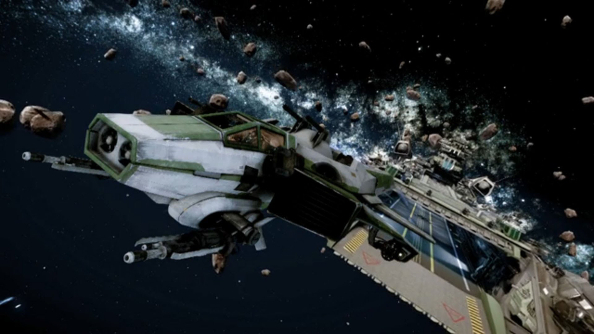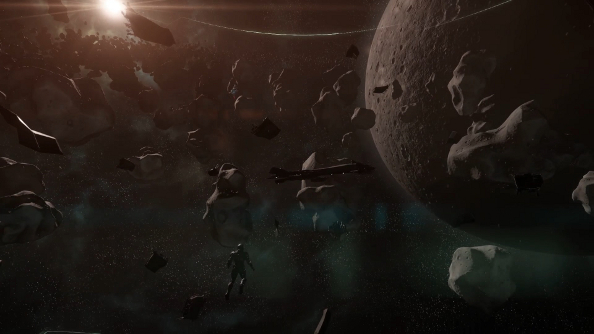On August 21st, independent space game developer Derek Smart instructed the California law firm de la Peña & Holiday to send a demand letter. Addressed to key figures at Cloud Imperium, the letter asked for three things: a complete, “forensic” accounting of the studio’s expenses on behalf of the backers who’ve contributed to Star Citizen’s $89.1 million crowdfunding total; a release date for the game now that its provisional Kickstarter window of November 2014 is long gone; plus a refund for every contributor upset about the space sim’s protracted development and enlarged scope.
Smart’s since heard back. Cloud Imperium co-founder and lawyer Ortwin Freyermuth wrote that Smart’s “defamatory claims are entirely without merit”. He argued that the information on the Star Citizen site would provide somebody of Smart’s industry knowledge with the tools to assess the project’s spending.
“We just laughed out loud,” Smart tells me. “How can anybody go to the website and say, ‘Oh, this is how $80 million dollars is being spent’? Who in their right minds would think that’s ok?”

Smart’s determined to help set a legal precedent that will allow Kickstarter backers to rest easy when contributing towards a project, and see developers think hard about the pitches they make. So he’s sending a few more letters. One to the Federal Trade Commission. One each to the attorney generals of Florida and California. And another to the FBI.
“Let’s put it this way – lawsuit or no lawsuit, somebody is going to hold them accountable,” he says. “Whether it’s us or the feds it’s all going to come out, it’s only a matter of time. And there’s absolutely nothing on this God’s Earth that can stop it.”
In June, the FTC negotiated a settlement between the creators of a Cthulhu-themed board game and their backers. The project’s manufacturer had failed to ship the game, and were ordered to repay the $111,793.71 they had acquired through crowdfunding.
#Crowdfunding platforms have a responsibility to act fairly & non-deceptively. #AskFTC https://t.co/UlYH7dPE0v
— FTC (@FTC) June 11, 2015
The FTC advised creators to keep their word when crowdfunding, and to use the money raised from crowdfunding only for the purpose represented. But Smart believes that until their stipulations are challenged in court, “they’re not worth the paper they’re written on”. Star Citizen, he maintains, is the most deserving case for the challenge.
“With this amount of money and exposure – $90 million dollars pledged and missed dates – all the original promises have been broken,” he says. “This isn’t hyperbole.”
It’s worth noting that the original Star Citizen Terms of Service the nascent Cloud Imperium wrote afterStar Citizen hit Kickstarterhad backers acknowledge that “delivery as of [the estimated date] is not a promise by RSI since unforeseen events may extend the development and/or production time.”
But the foundations of Smart’s argument lie in those same Terms of Service. When backers visited the Roberts Space Industries website to claim their rewards (alpha and beta access, plus a future digital soundtrack, universe map and 42-page manual at higher tiers) they agreed that their pledge couldn’t be refunded “until and unless RSI has failed to deliver the pledge items and/or the Game to you within 12 months after the estimated delivery date”.

Star Citizen’s scope has since expanded, and the ToS have changed, granting Cloud Imperium an extra six months to finish the game. But that initial estimated date came and went in November 2014. What’s more, the current terms agree to an audited cost accounting on the Star Citizen website “in the unlikely event that RSI is not able to deliver the Game and/or the pledge items”. Smart reckons all this leaves Cloud Imperium vulnerable to a specific performance court order, which would force them to fulfil the agreement made in their ToS.
“They haven’t delivered,” explains Smart. “So in November of 2015, which will have been a year since that [initial] launch date of November 2014, they will have to provide that accounting. And a refund.
“No-one asked them for this, they were the ones who said that if they don’t deliver in 12 months, we’ll tell you where the money went. This isn’t something that I’ve made up.”
Earlier in our chat, Smart had said that he didn’t believe that Chris Roberts or anybody at his company had “set out to commit fraud” (“What I think is that mistakes were made”). Yet he also thinks Cloud Imperium could fall foul of Fraud in the inducement – which would imply backers were persuaded into an agreement because of false information.

“That one is huge,” he claims. “If they made statements in 2012 and never fulfill or intend to fulfill those statements, that’s another cause of action. So everyone screaming that I have no standing simply doesn’t understand how these things work.”
Asked about Derek Smart at Gamescom this year, Chris Roberts said he tried “not to get into any of that”.
But then he said: “I think people who talk about other people’s work… I don’t know what to say, other than, if someone spent so much energy focusing on their own stuff, maybe people would like their own stuff better.
“There’s plenty of people who say you can’t do certain things and I don’t listen to them. You have to listen to people who have actually been able to do stuff and that you respect. That’s not the case [here].”
Some have accused Smart of courting attention for his Early Access space and planetary combat MMO, Line of Defense. They’ve questioned the method in his long and discursive blog posts, which he refers to by name: Interstellar Citizens; Interstellar Justice; Interstellar Breach.

But there are some things Derek wants you to understand. He isn’t an enemy of crowdfunding in principle, which he calls a “huge victory” for the way games are made. He’s not fighting this fight because he feels slighted, or because he’s jealous, or because he wanted the unsolicited $250 pledge refund Cloud Imperium gave him.
“I feel [that] no matter how I do – win, lose or draw – we’ll set some sort of precedent,” he says. “Even if it’s a simple thing such as the judge or arbitrator saying, ‘Yes, they have the right of access to your accounting’ – that’s huge. It just means that going forwards, nobody is going to go on Kickstarter, ask for money, and not be held accountable.”
Smart says he’s prepared for a protracted, expensive court case – he claims his games have made more than $200 million dollars over the course of his career. But if those letters arrive on the right desks, he suspects the state might stump up for him.
“What’s key here is whether it’s going to get to a judge before we know anything, or are the state attorneys going to get there first,” he says. “Those laws are very strict, so they can say, ‘This is Derek Smart’ all they want – but the bottom line is they pitched a product, they have not delivered, [and] they are not being held accountable.”

Given Smart’s rhetoric, it’s easy to think that the situation is doomed to escalate. But it’s worth noting that only $2.1 million of Star Citizen’s $89.1m crowdfunding total was raised during the initial Kickstarter campaign, before the game was rescoped. To get Smart to “shut up”, in his words, Cloud Imperium could simply refund that minority overnight.
“Let people wake up to an email saying, ‘Here’s your money’, and then sell a bunch more ships to cover that $2.1 million dollars,” Smart suggests. “Suddenly, the whole vision 1.0 and Kickstarter aberration goes away. This is not so hard.”
There’s a strange counterpoint to the fury and velocity of Smart’s crusade. He doesn’t actually want Cloud Imperium to fail. When contacted by a group wanting to build a class-action lawsuit around the information Smart has so meticulously gathered, he decided that “doing that sort of thing would have the appearance that I wanted it to fail, or I wanted to cause problems. That really wasn’t the case”.

Here’s what people don’t understand, says Smart: “There’s still, so far, no legal precedent for a crowdfunded project to be held accountable for slipping, not delivering and how the money is being spent… You have to start connecting the dots. We’re talking about $90 million with no accountability.
“For me, this whole thing [is] about gaining accountability for one of the largest crowdfunded projects in history, and the fact that it falls squarely in my backyard of space combat. This is bigger than Star Citizen. That’s the point.”
